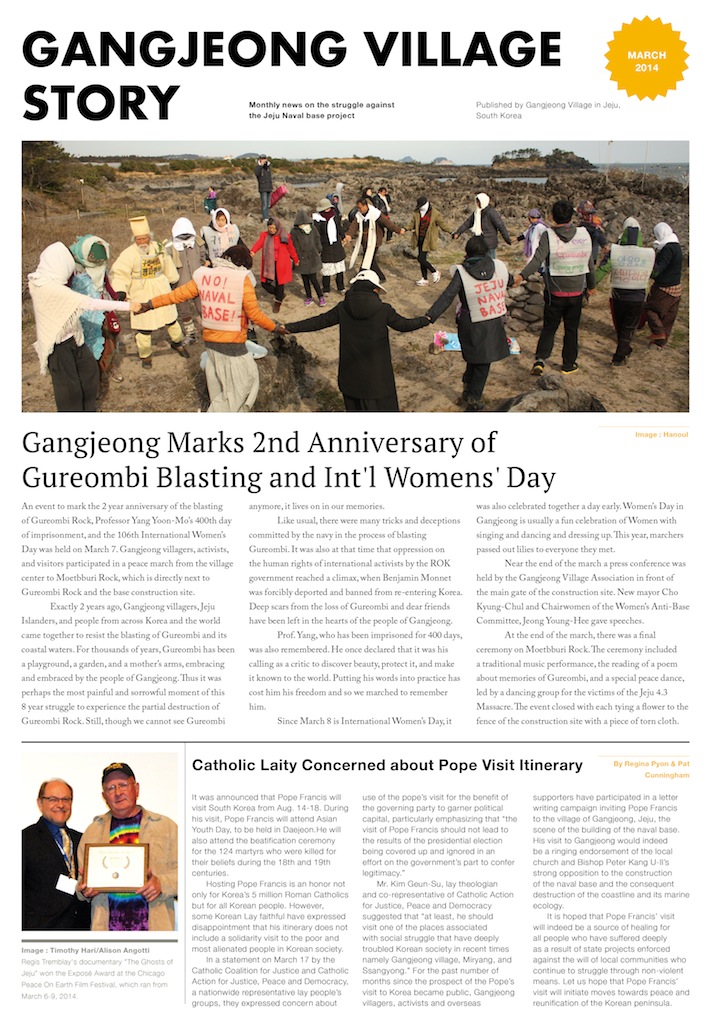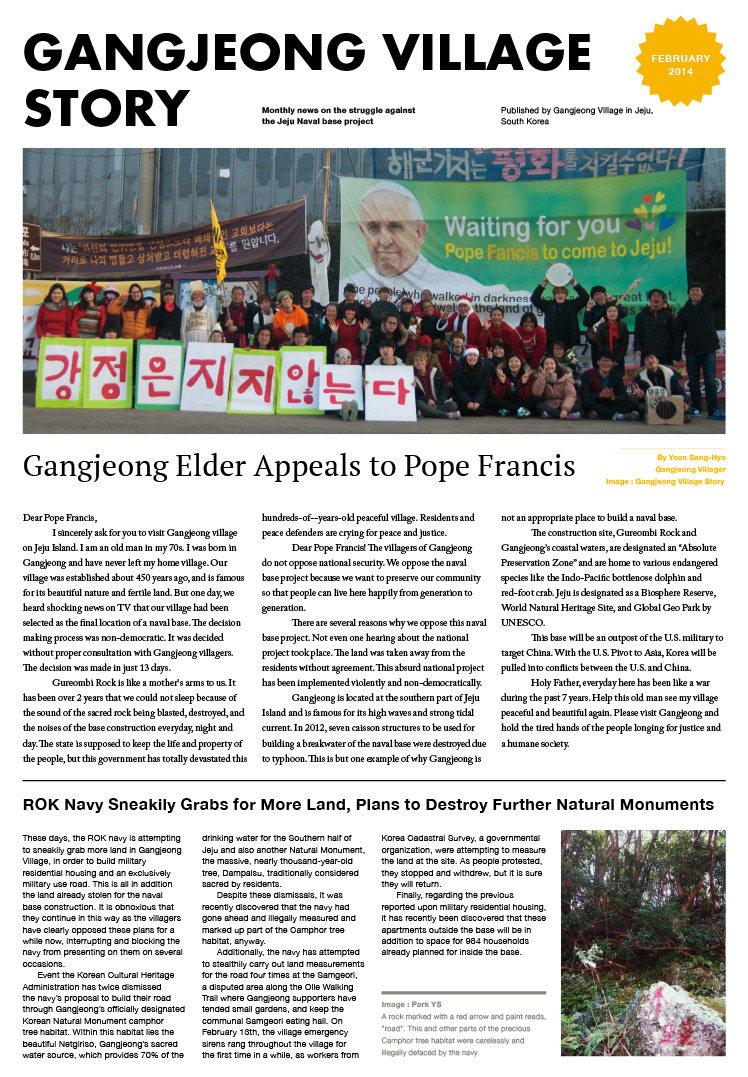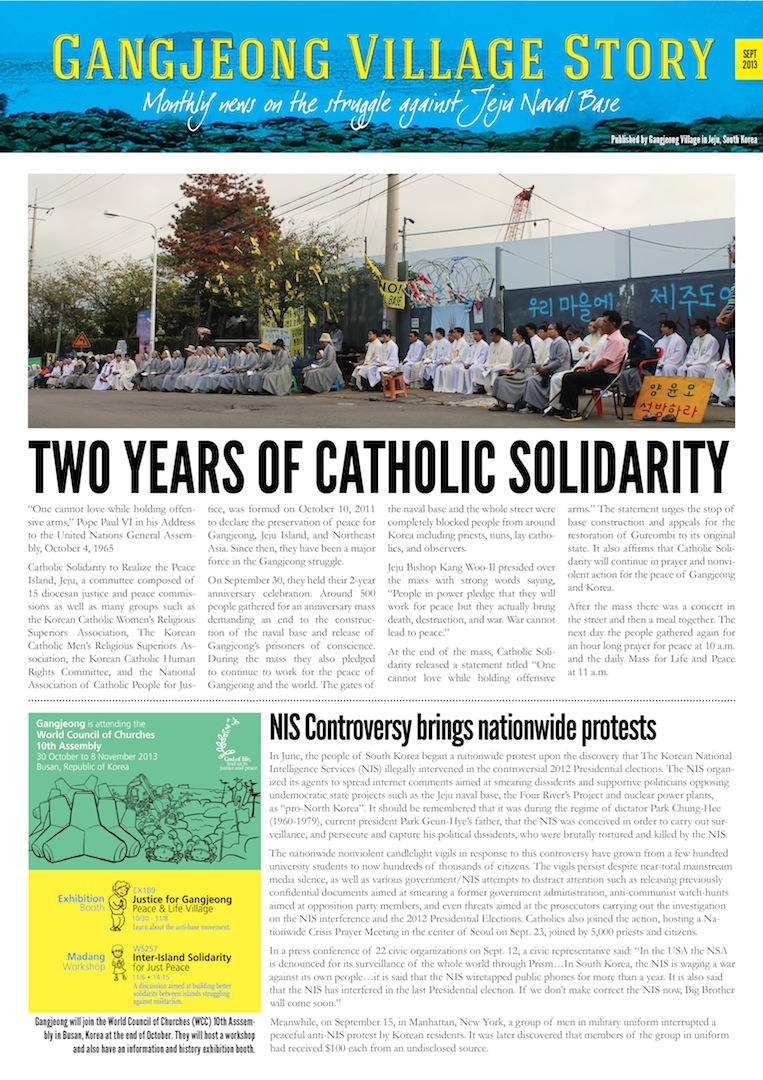In this month’s issue:
Government’s “development” plan, Catholics concerend about Pope’s Korea visit, Anniversary of Gureombi blasting, Solidarity from Benj and Global Network, Visting dancers, a play about Gangjeong, environmental destruction reports, another Gangjeong wedding, and more!
Save Jeju Now
No War Base on the Island of Peace
Tag: peace
-
Jeju Air Force Base and Arms Purchases Needed for Ieodo?
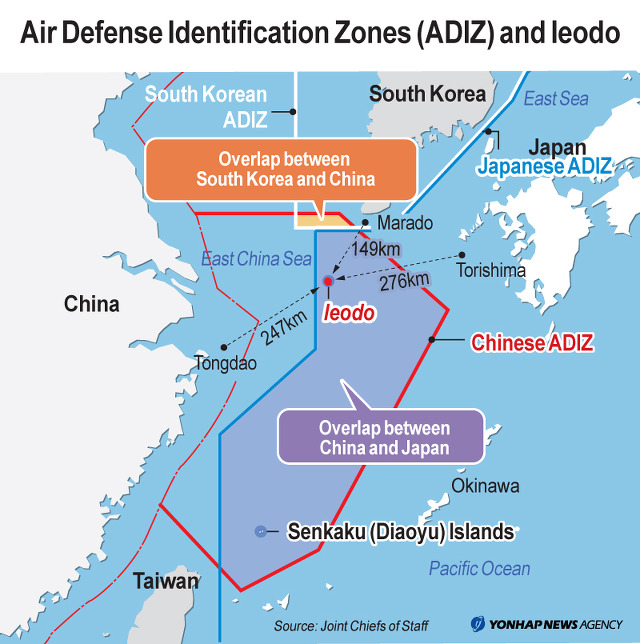
Source: Yonhap news ‘An air force general in the reserve saying that “A FIGHTER HEAVILY EQUIPPED WITH ARMS cannot load many arms for long distance (* here, to the Ieodo in the south of Jeju) because its operation radius cannot but be narrowed, “ stated that, ‘however, with air oil feeder, the problems can be solved[..].”
He also proposed as an alternative to BUILD AN AIR FORCE BASE in the vicinity of the naval base currently being constructed in the Jeju region.”
(Financial News, Nov. 26, 2013, excerpt translation, article fwd by Go Yu Gi)
His remarks follow the citations of the military personnel and experts who say that the current ROK air fighters are short of numbers and operation radius to fly to the Ieodo. The only available kinds of F-15 or KF-16 can saty on the sky of the Iedo only for 20 minutes, they say. The article is above all on the need of strengthening ROK air force; additional purchase of advanced fighters, introduction of air oil feeders, and base-building. The whole argument occurs with the need of including the Ieodo in the Korean Air Defense Identification Zone, since the China declaration on her ADIZ (Air Defense Identification Zone) on Nov. 23 in which she put the Ieodo, as well as the Senkaku(Dayou) Islands. Recently on Nov. 27, the South Korea Ministry of National Defense decided to purchase four air oil feeders from 2017 to 2019. The operation time would be extended to one hour then. Boeing KC-767 is one of the candidates. See the article here.
As well known, the key issue of the recently declared China Air Defense Identification zone lies in the Senkaku(Dayou) Islands that is claimed both by Japan and China (and possibly in the Yonaguni Islands between Taiwan and Japan). However, for the Koreans, the hot issue lies in the matter of the Ieodo. The Ieodo, the word originally comes from the word, ‘Ieodo’ which meant by the Jeju natives an imaginary Island, a ‘paradise.’ However, in reality, it is not an Island but a submerged ‘rock’ 149 km distant from the Korea-southern tip of the Marado (Island) located southward from the Jeju Island. It is known that the underwater of the Ieodo area is rich in resource: about 100 billion barrel crude oil and 7.2 billion ton natural gas at maximum. The Ieodo, though Koreans emotionally consider it as their own, has not been included in the Korean Air Defense Identification Zone which was drawn by the US military in 1951– but under the Japanese Air Defense Identification Zone, despite the Korean government’s demand on it. For more details, please refer to the reference links here
Korea has set up a maritime science research center on the rock, considering it as her own district sea area, despite the fact that a rock cannot be regarded as an element for territorial waters. The issue has lied on not territory but on the EEZ (Exclusive economic Zone).Anyway, because the Ieodo is put in the JDAIZ, Korea has made requests to Japan whenever she needed to fly to the Ieodo. Now with the China’s claim on her ADIZ on Nov. 23, the Ieodo is fated to be put between the overlapped ADIZs of Japan and China. The South Korean government is currently attempting to put the Ieodo in her ADIZ, though late. See theYonhap News article on Nov. 29.
To consider together of the currently disputed air defense identification zone and the Jeju naval base, one may remember the remarks on Oct. 18, 2012 by Kim Jae-Yoon, a member of the National defense Committee of the National Assembly and a member of the Jeju-based Democratic Party. He claimed in the National Assembly inspection on the ROK navy headquarter at the time, that “the cause that the Jeju naval base is necessary for the protection of south sea area is suspected to be merely a show.” He said the reason, “it is because the navy’s operation in the south sea area would be limited by the JADIZ (Japanese Air Defense Identification Zone), even though the navy has stated that the purpose to build the Jeju naval base lies in effective supervision and protection on the south sea area and sea lane.’ Kim pointed out that:‘While the Korea Air Defense Identification Zone( KADIZ) is set close to the Jeju island, the Japanese Air Defense Identification Zone (JADIZ) is set below the south sea of the Jeju and the Ieodo also belongs to the JADIZ.’ For more on this, see here.
His remark was, in fact, very likely to be much helped by the resource collected by the Gangjeong Village Association who prepared in September, 2011, for the national Assembly inquiry.
The current dispute on the air defense identification zone refreshingly reminds also that Korean military is subordinating to the United States and Japan military under the name of the ROK-US-Japan trilateral alliance. It also stresses not only that Korea, especially Jeju has to wisely maintain its balance sense amidt the conflict between the United States/ Japan and China but also in the critical role to contribute to the peace of the north east Asia. The weakest has the key, you might say.
Though it might be a casual proposal, the idea of building an air force base in the Peace Island is dangerous, adding to our concern about the possibility of militarization of Jeju.
To see the map, the overlapped area of ADIZs among China, Japan, and Korea could be an interesting area. It depends on the people keenly related to the area whether the overlapped zone, known to be resource-rich area would be the field of conflict or co-existing peace. You can see more maps here.
-
Statement by the Peoples Forum of Peace for Life, Jeju
Fwd by Pamela K Brubaker, Professor Emerita of Religion, California Lutheran University
To see the PFPL statement, ‘In Solidarity with Gangjeong Villagers Say No to the Jeju Naval Base!’ go to HERE.

Photo by Jo Yak Gol, Oct. 27, 2013 Affirming Life Together in the Face of Belligerent Empire
We the participants of the 3rd Peoples Forum of Peace for Life gathered at the April 3rd Peace Park in Jeju Special Self-Governing Province in the Republic of Korea from 23rd to 27th of October 2013. We had a women-led solidarity mission to Jeju and to Gangjeong Village, and shared common experiences of threats to life in our respective societies and throughout the world. Inspired by our faith traditions’ shared affirmation of life, we issue this call to solidarity and action.
In Solidarity with Gangjeong Villagers and Say No! to Jeju Naval Base
We note with concern that the government of the Republic of Korea has enforced a naval base construction in Gangjeong village, Jeju Island since 2007, without proper consultation with villagers and consideration of villagers’ right to environment, land and peace. We are distressed to witness how a large-scale development profiting big corporations can destroy peace in a village under the name of protecting national security. For seven years the people of Gangjeong village have resisted the base construction and suffered unjustly from abuse by authorities in response to their non-violent campaign against the construction of a naval base which will militarise the sea of East Asia. We witnessed the strong resistance of the historic tradition of Jeju women lived out in the Gangjeong village struggle against the base construction. They have been accompanied by activist groups from around the world. The Catholic Church, in particular, has been a presence for the last two years, offering mass every day to draw attention to this travesty.
We, the participants of the 3rd People’s Forum, stand in solidarity with the people of Gangjeong village in their peaceful struggle against maritime militarisation. Jeju people have a full right to resist the repeat of the last century’s tragedy, the April 3rd massacre in 1948 of tens of thousands of Jeju islanders. The people of Gangjeong village present a strong call to open a new era of peace and cooperation in East Asia for themselves and for all of us.
The Not-so-Innocent Language of Empire: Toward a Counter-Narrative
The emerging US national security state is a symptom of an increasingly desperate empire seeking to maintain its hegemony, harming the living conditions of many of its own and other peoples while repressing dissent at home and in politically “hot” regions. The imperial system wages war on the people of the world. It is defined by the nexus of the national security state and predatory corporate capitalism.
Beginning with the end of the Second World War, the US led imperial model has been imposed in several parts of the world, in Central and Latin America, the Middle East, Southeast Asia, and Africa. Key instruments of the imperial system are militarization and coups, capture of international financial and trade institutions, neoliberal market economy, and socio-cultural controls of media, communication, and education.
The Empire employs deceptive language and consciousness to legitimize its ambitions. In the solidarity mission to Jeju, we noted the ruthlessness of the innocent-sounding “US pivot to Asia.” Instead of increasing friendly relations with Asia, it involves the new geo-political imperatives of Empire regarding China and the American presence in this economically dynamic region.
Nuclear weapons and nuclear power are two dimensions of one reality, which the nuclear military industrial complex promotes and benefits from. There is no peaceful use of nuclear power (“Atoms for Peace”), as the disaster at Fukushima shows. Forced evacuation of 150,000 people continues, highly radioactive contaminated water has not been brought under control, and efforts to restart nuclear power plants are underway, as well as export of such plants.
The Empire claims to “fight terror”, “protect national security,” and “advance democracy and human and women’s rights.” These discourses of “Western” values advance imperial dominance. Activism for justice and peace is branded as “terrorism”, and Muslims resisting colonization and wars in their lands are termed terrorists. The imperial promotion of human and women’s rights has the opposite effect of what is proclaimed.
We need to expose the moral and political-intellectual bankruptcy of these imperial claims, and advance a counter-understanding of the threats to the lives of both the human- and non-human living world, as well as the life of the planet. We must offer alternative approaches in order to live justly, sustainably, and peacefully in this world.
Toward an Interfaith Praxis of Resistance to Empire
We are at a time when a global, powerful, and meaningful phenomenon like religion can no longer ignore the multiple crises surrounding it and catastrophically affecting its adherents. In particular, the “war on terror” has harmed Muslim-Christian relations in Africa, Asia and the Middle East. One of the most effective legitimating factors for the violence of the powerful in the world today is religion in general, and especially some powerful institutional actors located within the various religious traditions.
This trend needs to change and there are increasing voices which are calling on their religious leaders and communities to rekindle the real liberating spirit and ethos of their religious traditions. This is a time when all of the great, lively religious and spiritual traditions that provide fundamental values of justice, sustainability, and peace are under pressure to be co-opted by the powerful to support ongoing injustice and inequality in the world.
We meet here to affirm that these traditions must have no tolerance for the widespread, unfolding genocide taking place against the world’s peoples, and the concomitant ecocide of our home, planet Earth. The peoples of the world are suffering layer upon layer of injustice and brutality, and our religious and spiritual communities can no longer maintain their silence or just pay lip service to justice and peace. These communities must continue their prophetic and authentic missions of forcefully challenging the empire and its powerful allies, institutions, and policies and practices – in cooperation with like-minded social movements and peoples movements. We call upon our religious and spiritual communities to commit their leadership, constituencies, and resources to mobilize against these trends of domination, subordination, and destruction of peace-loving peoples, societies, and our ecosphere.
Our Common Call
We continue to be inspired by the heroic resistance waged by social movements in Latin America, the Philippines, India and many other places against neoliberalism and US hegemony, and call for meaningful support for and solidarity with these progressive forces.
Inspired by the long history of ecumenical witness for improved North-South Korean relations, particularly between the two Christian communities, we offer our solidarity to a reinvigorated process of dialogue and exchange with a view to generating a political environment conducive for reunification, beginning withrenewed engagement between the two sides to turn the Armistice into a peace treaty.
We urge resistance to financial instruments and trade agreements, such as the Trans-Pacific Partnership, which undermine our commitment to place people and the environment before profit.
We strongly condemn the corporate violence leashed out in Odisha, India, on the struggling communities and the environment by the POSCO company hand-in-glove with the Indian government. We demand the immediate release of people who are arrested and accused on fabricated cases. We demand the withdrawal of POSCO so that the communities can live in peace with nature. We ask the people of Gangjeong village in Jeju and other citizens of Republic of Korea to be in solidarity with the people in Odisha, India.
We call on people of faith and conscience to continue their support of the Arab people’s resistance against tyranny and occupation, and to oppose the regional and global counter-revolutionary political actors denying their aspirations for human dignity and social justice. We especially reaffirm the need for steadfast support for Palestinian national liberation and maintain our commitment to our Palestine solidarity work.
We call on the faith communities to actively combat the rising tide of Islamophobia, which facilitates greater imperial violence against Muslims.
We strongly denounce the growing network of the U.S. military power both through building bases and expanding access through Visiting Forces and Status of Forces Agreements throughout the world, including here in the Republic of Korea, and the accompanying patriarchal and sexual violence, exploitation, and suffering inflicted on women. We are inspired by and give our unconditional solidarity to the heroic resistance waged by women against such barbarism.
We deplore the state and private financing of bloated military budgets and the arms trade, and call for significant reduction in military expenditures and an end to the arms trade, so that these funds may be invested in life affirming programs.
We call on religious communities and peoples committed to peace to condemn the introduction and use of drone warfare, and demand an end to their use.
We affirm movements against nuclear power plants in Japan, India, and many other countries, and support their efforts to hold accountable governments and corporations for harm they have caused.
We call on the peoples of the nuclear armed states and those states protected by them to join with the 124 nations resolving to never use nuclear weapons.
We strongly encourage equitable negotiations between the US and Iran with a view to additional subsequent agreement on the imperative of establishing a Nuclear-Weapon-Free Zone in the Middle East. We affirm that establishing similar zones in South Asia and Northeast Asia is also urgent.
We remain committed to our critique of global injustices and global hegemony, although this in itself does not offer an alternative to the prevailing world order. Alternative structures, institutions, laws and policies must be premised upon an all-embracing alternative consciousness which privileges attitudes and values that the Empire has hitherto ignored or downplayed. Love, for instance, should be foregrounded as a defining attribute of the individual and collective consciousness of the human family. When love begins to shape our behaviour and action in a profound manner, it will have a huge impact upon all spheres of society including economics and politics. For love has the potential to demolish ego-centric attitudes that boost the insane drive for power and wealth that often leads to hegemony.
Adopted 27 October 2013
Jeju April 3 Peace Park, Republic of Korea
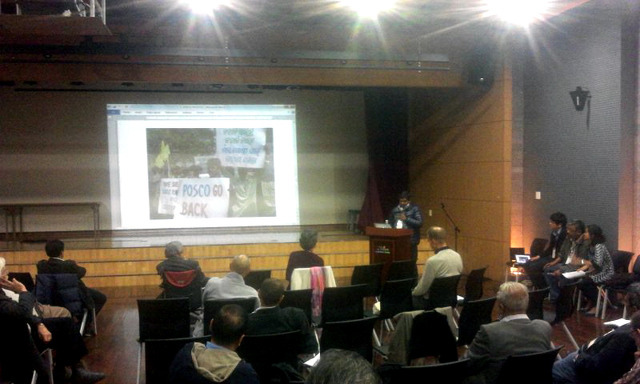
An Indian activist presents on the ‘corporate violence leashed out in Odisha, India, on the struggling communities and the environment by the POSCO company hand-in-glove with the Indian government.
You can see a video presented by him, here. To be co-incident, POSCO is another main company for the Jeju naval base construction. See here. For the two presented videos on people’s struggle opposing the POSCO, see here and here.
-
Gangjeong Goes to the World Council of Churches 10th Assembly in Busan, Korea
From October 30 until November 8, The World Council of Churches (WCC) will hold its every 7-years global assembly in Busan on the southern tip of the mainland of Korea.
According to the WCC website:
“The WCC brings together churches, denominations and church fellowships in more than 110 countries and territories throughout the world, representing over 500 million Christians and including most of the world’s Orthodox churches, scores of Anglican, Baptist, Lutheran, Methodist and Reformed churches, as well as many United and Independent churches. At the end of 2012, there were 345 member churches.”
And regarding the assembly:
“The assembly is the highest governing body of the World Council of Churches (WCC), and meets every seven years. It is a moment when the fellowship of member churches comes together as a whole in prayer and celebration.
The assembly has the mandate to review programmes, to issue public statements and determine the overall policies of the WCC, as well as to elect presidents and a Central Committee that oversees the council’s work until the next assembly.
Along with the WCC member churches, partner organizations and other churches have a strong presence at the event. This makes an assembly of the WCC the most diverse Christian gathering of its size in the world. It is a unique opportunity for the churches to deepen their commitment to visible unity and common witness so that world may believe.
The WCC was established at its 1st Assembly in Amsterdam, Netherlands (1948). Since then assemblies have been in held in Evanston, United States (1954); New Delhi, India (1961); Uppsala, Sweden (1968); Nairobi, Kenya (1975); Vancouver, Canada (1983); Canberra, Australia (1991); Harare, Zimbabwe (1998); and Porto Alegre, Brazil (2006).
The theme of the 10th Assembly is: “God of Life, lead us to Justice and Peace” . Which as you can see is a very good theme for a village like Gangjeong, known as the Life and Peace Village, which is struggling for Justice. With this in mind. Gangjeong Village and its supporters will have a presence at this years WCC.
As you can see in the above graphic. There will be both a Madang Workshop and an Exhibition Booth.
Madang Workshop:
The Workshop will take place on Wednesday, November 6 from 2:15-3:45 p.m. It is called, Inter-Island Solidarity for Peace: Establishing Peace Against maritime Militarization.
This is workshop will be a discussion about strategies, failures and successes of anti-militarism and anti-base movements. The main focus is on building a better and stronger network between islands who are suffering similar injustices. Guest speakers will be joining from Jeju, Okinawa, the Philippines, Hawaii, and Lanyu (in Taiwan). We are hoping that many other islanders and people struggling against unwanted military bases and land seizures will join as for the discussion as well.
Exhibition Booth:
We will also have a booth for the duration of the WCC assembly from morning until evening. It is Booth #50. It is in the blue section under the name “Gangjeong Village Association”. There will be pictures, displays, videos, brochures, newsletters, postcards, books, handicrafts, and friendly people.
If you are at the WCC Assembly in Busan, please come by our booth and also think about joining our workshop!
Open Letter to the WCC:
Finally and perhaps most importantly, the Gangjeong Village Association, The Jeju Pan-Island Committee for Stop of Military Base and for Realization of Peace Island, and The National Network of Korean Civil Society for Opposing to the Naval Base in Jeju Island have issued an open letter calling for the World Council of Churches to issue a public statement for peace against Asia-Pacific maritime militarisation. The letter is reproduced below and also can be found at this link. Please spread this to anyone you know who might have connections with the WCC or is attending this assembly:
Calling for the Issue of a Public Statement for Peace against Asia-Pacific Maritime Militarization:
“Guide our feet into the way of peace” (Luke 1:79)
We are writing to urge the delegates of Member Churches of the World Council of Churches (WCC) to seriously consider issuing a public statement on building peace in the Asia-Pacific against maritime militarization. Today, we are witnessing a rise of militarism under the name of peace and prosperity in the Asia-Pacific. Tension between the economic and military expansion of China and the corresponding the U.S. “Asian Pivot” strategy has sparked an escalation in the war-profit industry and an arms race for global military dominance. This has left in its wake conflict and suffering, and the destruction of land, cultures, and traditions across the Asia-Pacific. These false idols of security and economic expansion runs counter to the justice, peace, and life that are the core values of the World Council of Churches and Christians everywhere.
A key example of the impact of this militarization can be seen in Gangjeong Village, Jeju Island, Republic of Korea. One of the oldest and most naturally beautiful villages of Jeju, the unique eco-systems of Gangjeong are a showcase of God’s creative spirit, home to numerous endangered species and the world’s largest temperate soft coral forest. Since 2007, without the villagers’ consent, it has become the site of massive naval base construction. If built, the Jeju naval base will be a critical outpost of the ROK-Japan-U.S. maritime military alliance targeting China. As a result, Jeju, ironically known as “the Island of Peace”, will become a primary target, leading to devastating loss of life and destruction.
Dedicated to the care of creation and the spread of life, the struggle against the base in Gangjeong is an open and truly ecumenical/inter-faith resistance for justice. Catholics, Protestants, Quakers, Anabaptists, Buddhists, and Shamanists have come together to create a vital community, marked by vibrant practice of faith and respect for different traditions without dilution or conflict. Despite police crackdowns on religious expression and assembly, Catholic priests hold daily mass in front of the construction site, Protestants have prayer services, and Shamans perform traditional rituals. The ingredients that hold it all together are a steadfast desire for God’s justice, a dream of life together, and a commitment to nonviolent peacemaking. We hope that the struggle against the Jeju naval base construction, which is a microcosm of the maritime militarization of the Asia-Pacific, can be a call to Christians and all people of God to return to the path of peace.
It is now urgent for churches to respond to the escalating maritime militarization and violence in the Asia-Pacific region that runs counter to the call of the people of God to peacemaking. As mentioned in an “Ecumenical Call for Just Peace,” churches should become builders of a culture of peace while recognizing the promise of peace is a core value of all religions. The farmers of Gangjeong Village on Jeju Island are at the forefront of such a faithful realization of the Kingdom of God. Let’s not turn their plowshares into swords.
Therefore, we call upon the World Council of Churches to:
• Issue a public statement at the 10th Assembly of World Council of Churches, formally expressing its grave concern regarding maritime militarization in the Asia-Pacific which is a threat to regional and global just peace;
• Urge the government of the Republic of Korea to stop the Jeju naval base construction and focus on peaceful approaches to cooperation;
• Call upon the government of the Republic of Korea to protect and promote all human rights including the right to peace and environment of the people of Gangjeong Village;
• Appeal to the churches and national ecumenical councils in the region to take serious measures to stop the arms race and make the Pacific the Sea of Peace.
Yours Sincerely,
Mr. Dong-Kyun Kang / Ms. Young-hee Jeong
Village Mayor / Chairwoman
Gangjeong Village Association / Village Women’s CommitteeMr. Gi-Ryong Hong / Ms. Ri-ri Hong
Co-convenor / Co-convenor
Jeju Pan-Island Committee for Stop of Military Base and for Realization of Peace IslandMr. Taeho Lee / Ms. Hye-ran Oh
Co-convenor / Co-convenor
National Network of Korean Civil Society for Opposing to the Naval Base in Jeju Island* Contact Details:
Ms. Gayoon Baek, National Network of Korean Civil Society for Opposing to the Naval Base in Jeju Island, gayoon@pspd.org
Mr. Paco Michelson, Gangjeong International Team, gangjeongintl@gmail.comPlease spread the word, come join us at the WCC Assembly in Busan, and thanks for your support!
